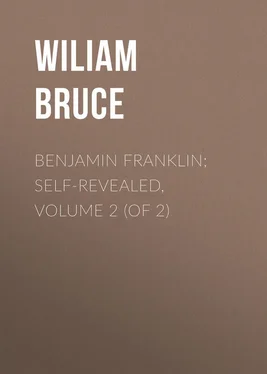Wiliam Bruce - Benjamin Franklin; Self-Revealed, Volume 2 (of 2)
Здесь есть возможность читать онлайн «Wiliam Bruce - Benjamin Franklin; Self-Revealed, Volume 2 (of 2)» — ознакомительный отрывок электронной книги совершенно бесплатно, а после прочтения отрывка купить полную версию. В некоторых случаях можно слушать аудио, скачать через торрент в формате fb2 и присутствует краткое содержание. Жанр: foreign_antique, foreign_prose, на английском языке. Описание произведения, (предисловие) а так же отзывы посетителей доступны на портале библиотеки ЛибКат.
- Название:Benjamin Franklin; Self-Revealed, Volume 2 (of 2)
- Автор:
- Жанр:
- Год:неизвестен
- ISBN:нет данных
- Рейтинг книги:4 / 5. Голосов: 1
-
Избранное:Добавить в избранное
- Отзывы:
-
Ваша оценка:
- 80
- 1
- 2
- 3
- 4
- 5
Benjamin Franklin; Self-Revealed, Volume 2 (of 2): краткое содержание, описание и аннотация
Предлагаем к чтению аннотацию, описание, краткое содержание или предисловие (зависит от того, что написал сам автор книги «Benjamin Franklin; Self-Revealed, Volume 2 (of 2)»). Если вы не нашли необходимую информацию о книге — напишите в комментариях, мы постараемся отыскать её.
Benjamin Franklin; Self-Revealed, Volume 2 (of 2) — читать онлайн ознакомительный отрывок
Ниже представлен текст книги, разбитый по страницам. Система сохранения места последней прочитанной страницы, позволяет с удобством читать онлайн бесплатно книгу «Benjamin Franklin; Self-Revealed, Volume 2 (of 2)», без необходимости каждый раз заново искать на чём Вы остановились. Поставьте закладку, и сможете в любой момент перейти на страницу, на которой закончили чтение.
Интервал:
Закладка:
But if he (the reader) can not on these Considerations, quite excuse the Assembly, what will he think of those Honourable Proprietaries, who when Paper Money was issued in their Colony for the Common Defence of their vast Estates, with those of the People, and who must therefore reap, at least, equal Advantages from those Bills with the People, could nevertheless wish to be exempted from their Share of the unavoidable Disadvantages. Is there upon Earth a Man besides, with any Conception of what is honest, with any Notion of Honor, with the least Tincture in his Veins of the Gentleman, but would have blush'd at the Thought; but would have rejected with Disdain such undue Preference, if it had been offered him? Much less would he have struggled for it, mov'd Heaven and Earth to obtain it, resolv'd to ruin Thousands of his Tenants by a Repeal of the Act, rather than miss of it, and enforce it afterwards by an audaciously wicked Instruction, forbidding Aids to his King, and exposing the Province to Destruction, unless it was complied with. And yet, – these are Honourable Men … Those who study Law and Justice, as a Science [he added in an indignant note] have established it a Maxim in Equity, "Qui sentit commodum, sentire debet et onus." And so consistent is this with the common Sense of Mankind, that even our lowest untaught Coblers and Porters feel the Force of it in their own Maxim, (which they are honest enough never to dispute) "Touch Pot, touch Penny."
Other passages in the Preface were equally scorching. Replying to the charge of the Proprietaries that the Quaker Assembly, out of mere malice, because they had conscientiously quitted the Society of Friends for the Church, were wickedly determined to ruin them by throwing the entire burden of taxation on them, Franklin had this to say:
How foreign these Charges were from the Truth, need not be told to any Man in Pennsylvania . And as the Proprietors knew, that the Hundred Thousand Pounds of paper money, struck for the defence of their enormous Estates, with others, was actually issued, spread thro' the Country, and in the Hands of Thousands of poor People, who had given their Labor for it, how base, cruel, and inhuman it was, to endeavour by a Repeal of the Act, to strike the Money dead in those Hands at one Blow, and reduce it all to Waste Paper, to the utter Confusion of all Trade and Dealings, and the Ruin of Multitudes, merely to avoid paying their own just Tax! – Words may be wanting to express, but Minds will easily conceive, and never without Abhorrence!
But fierce as these attacks were, they were mild in comparison with the shower of stones hurled by Franklin at the Proprietaries in the Preface in one of those lapidary inscriptions which were so common in that age. The prefacer of Dickinson's Speech had inserted in his introduction a lapidary memorial of William Penn made up of tessellated bits of eulogy, extracted from the various addresses of the Assembly itself. This gave Franklin a fine opportunity to retort in a similar mosaic of phrases and to contrast the meanness of the sons with what the Assembly had said of the father.
That these Encomiums on the Father [he said] tho' sincere, have occurr'd so frequently, was owing, however, to two Causes; first, a vain Hope the Assemblies entertain'd, that the Father's Example, and the Honors done his Character, might influence the Conduct of the Sons; secondly, for that in attempting to compliment the Sons on their own Merits, there was always found an extreme Scarcity of Matter. Hence the Father, the honored and honorable Father , was so often repeated, that the Sons themselves grew sick of it; and have been heard to say to each other with Disgust, when told that A, B, and C. were come to wait upon them with Addresses on some public Occasion, " Then I suppose we shall hear more about our Father. " So that, let me tell the Prefacer, who perhaps was unacquainted with this Anecdote, that if he hop'd to curry more Favor with the Family, by the Inscription he has fram'd for that great Man's Monument, he may find himself mistaken; for, – there is too much in it of our Father .
If therefore, he would erect a Monument to the Sons, the Votes of Assembly, which are of such Credit with him, will furnish him with ample Materials for his Inscription.
To save him Trouble, I will essay a Sketch for him, in the Lapidary Style, tho' mostly in the Expressions, and everywhere in the Sense and Spirit of the Assembly's Resolves and Messages.
Be this a Memorial
Of T – and R – P – ,
P – of P, —
Who, with Estates immense,
Almost beyond Computation,
When their own Province,
And the whole British Empire
Were engag'd in a bloody and most expensive War,
Begun for the Defence of those Estates,
Could yet meanly desire
To have those very Estates
Totally or Partially
Exempted from Taxation,
While their Fellow-Subjects all around them, Groan'd
Under the Universal Burthen.
To gain this Point,
They refus'd the necessary Laws
For the Defence of their People,
And suffer'd their Colony to welter in its Blood,
Rather than abate in the least
Of these their dishonest Pretensions.
The Privileges granted by their Father
Wisely and benevolently
To encourage the first Settlers of the Province,
They,
Foolishly and cruelly,
Taking Advantage of public Distress,
Have extorted from the Posterity of those Settlers;
And are daily endeavouring to reduce them
To the most abject Slavery:
Tho' to the Virtue and Industry of those People
In improving their Country,
They owe all that they possess and enjoy.
A striking Instance
Of human Depravity and Ingratitude;
And an irrefragable Proof,
That Wisdom and Goodness
Do not descend with an Inheritance;
But that ineffable Meanness
May be connected with unbounded Fortune.
It may well be doubted whether any one had ever been subjected to such overwhelming lapidation as this since the time of the early Christian martyrs.
There are many other deadly thrusts in the Preface, and nowhere else are the issues between the Proprietaries and the People so clearly presented, but the very completeness of the paper renders it too long for further quotation.
Franklin, however, was by no means allowed to walk up and down the field, vainly challenging a champion to come out from the opposing host and contend with him. At his towering front the missiles of the Proprietary Party were mainly directed. Beneath one caricature of him were these lines:
"Fight dog, fight bear! You're all my friends:
By you I shall attain my ends,
For I can never be content
Till I have got the government.
But if from this attempt I fall,
Then let the Devil take you all!"
Another writer strove in his lapidary zeal to fairly bury Franklin beneath a whole cairn of opprobrious accusations, consuming nine pages of printed matter in the effort to visit his political tergiversation, his greed for power, his immorality and other sins, with their proper deserts, and ending with this highly rhetorical apostrophe:
"Reader, behold this striking Instance of
Human Depravity and Ingratitude;
An irrefragable Proof
That neither the Capital services
of Friends power, tyranny."
Nor the attracting Favours of the Fair,
Can fix the Sincerity of a Man,
Devoid of Principles and
Ineffably mean:
Whose ambition is
And whose intention is
The illegitimacy of William Franklin, of course, was freely used during the conflict as a means of paining and discrediting Franklin. In a pamphlet entitled, What is sauce for a Goose is also Sauce for a Gander , the writer asserted that the mother of William was a woman named Barbara, who worked in Franklin's house as a servant for ten pounds a year, that she remained in this position until her death and that Franklin then stole her to the grave in silence without pall, tomb or monument. A more refined spirit, which could not altogether free itself from the undertow of its admiration for such an extraordinary man, penned these lively lines entitled, "Inscription on a Curious Stove in the Form of An Urn, Contrived in such a Manner As To Make The Flame Descend Instead of Rising from the Fire, Invented by Dr. Franklin."
Читать дальшеИнтервал:
Закладка:
Похожие книги на «Benjamin Franklin; Self-Revealed, Volume 2 (of 2)»
Представляем Вашему вниманию похожие книги на «Benjamin Franklin; Self-Revealed, Volume 2 (of 2)» списком для выбора. Мы отобрали схожую по названию и смыслу литературу в надежде предоставить читателям больше вариантов отыскать новые, интересные, ещё непрочитанные произведения.
Обсуждение, отзывы о книге «Benjamin Franklin; Self-Revealed, Volume 2 (of 2)» и просто собственные мнения читателей. Оставьте ваши комментарии, напишите, что Вы думаете о произведении, его смысле или главных героях. Укажите что конкретно понравилось, а что нет, и почему Вы так считаете.










![Benjamin Franklin - Memoirs of Benjamin Franklin; Written by Himself. [Vol. 2 of 2]](/books/747975/benjamin-franklin-memoirs-of-benjamin-franklin-wr-thumb.webp)
![Benjamin Franklin - Memoirs of Benjamin Franklin; Written by Himself. [Vol. 1 of 2]](/books/748053/benjamin-franklin-memoirs-of-benjamin-franklin-wr-thumb.webp)
